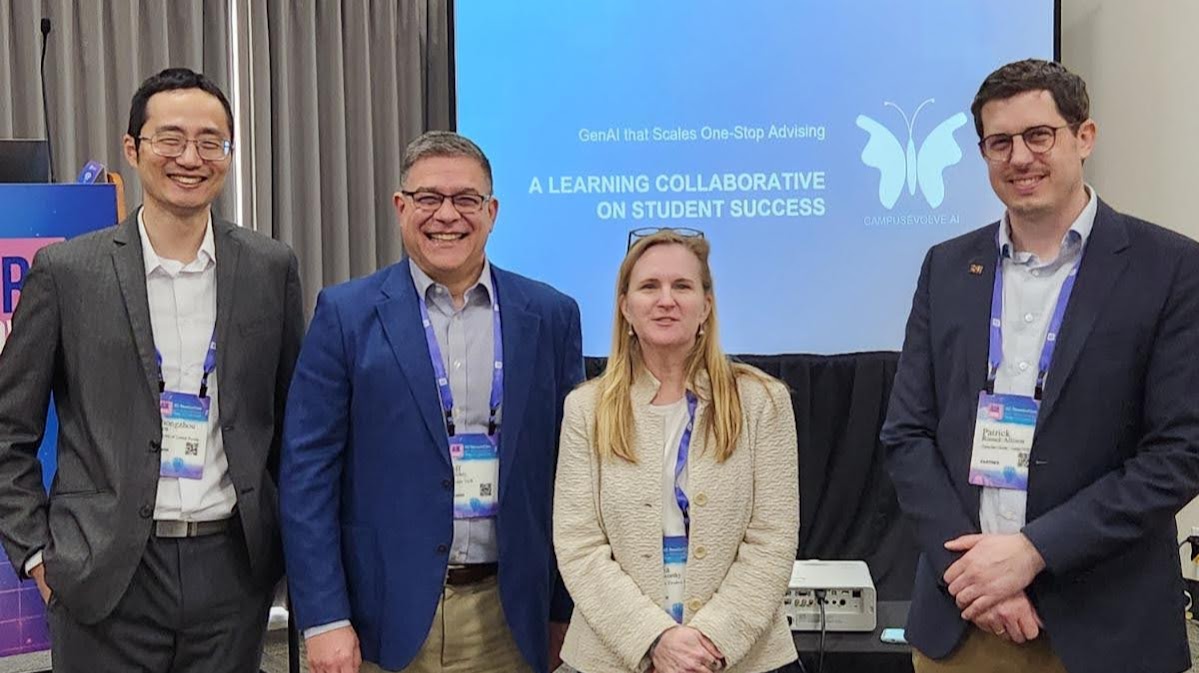Four Trips in Four Months on Gen AI in Education: Thoughts and Takeaways
I somehow ended up doing one trip each month for the past four months. And the theme of each trip? Generative AI in Education. It really is getting pretty crazy.
So, takeaways and thoughts from each trip before I get them mixed up or forget about them:
April 5-7: ASU + GSV AIRShow

I did a panel with some awesome folkes, all connected together by Maria, whose company CampusEvolve is doing an incredible job building a Gen-AI based student advising system that is totally worth its own post someday. Talked to over a dozen different education companies all trying to do something with GenAI in education. Takeaways:
-
How good is any AI tutor? There are at least five or six AI tutor bots out there, from very fancy ones to ones that seems nothing more than a GUI on top of vanilla GPT. Not a single one has any data to show on how it improves student learning, or how students are using those AI tutors.
-
Mapping learning resources to states standards is a BIG business in K-12. But sometimes it seems to just be a game of finding the most similar words between a problem and a standard. I think it is time to completely re-think the concept of “education standards” or “learning goals”.
-
Bethanie Drake-Maples gave some very provocative critics and thoughts on STEM assessments, and on the lack of collaboration between education industry and education research. I’m very curious what their company is trying to create, although their website seems to be little more than an AI generated place-holder.
BTW , which genius came up with the name of “AIR show”, which stands for AI revolution in Education? Every time I try to google for it I get tons and tons of fighter jet pictures….
May 7-10: University of Maryland Baltimore County + Dave Pritchard Alumni Fest
Invited by Lili Cui and Karen Chen to give a talk at UMBC physics depratment. Of course, I talked about my AI work and the focus of all conversations are around GPT and GenAI. Takeaways:
- Save the teacher some time! Even the most conservative physics faculty gets excited at the idea that LLMs could help them grade some papers, or write some problems quickly.
I then went to MIT and attended the joint alumni-fest of Dave Pritchard, my postdoc advisor in physics education, and Wolfgang Ketterle, Dave’s postdoc a long time ago who won the Nobel Prize for creating the first Bose-Einstein condensate in the lab. Thoughts and Takeaways:
- A community of cool and proud scientists: As an education researcher, I’ve never thought about community building and culture very much. But after listening to two days worth of talks from world experts to graduate students doing cold atom physics, what struck me the most was the things that these people share, and pride: taking data at midnight (with pride and sometimes booze), blowing up experimental apparatus (or bathroom sinks for that matter), strange but interesting physics challenges, the frustration of nothing works and the joy of something finally starts to work. This is a group of people working their head off on some of the hardest problems in the world, but also are extremely proud of what they do and the way they do it. How do we, as educators, build this type of value and feeling into our students, even just a little bit??
I use to think that this type of community building is out of reach for a quantitative research person like me, but with LLMs, I think there I might be able to do something about it.
June 5-6: APS-DAMOP meeting
By pure coincidence, I was invited to give a talk (many thanks to Heather Lewandowski for the invitation!) on GenAI and Education at APS Division of Atomic, Molecular and Optics conference, Dave Pritchard’s community before he became an education researcher, less than a month after attending the alumni-fest. Had some very interesting conversation with audience about GenAI, and great chatting with Heather. Thoughts and Takeaways:
- What is Understanding?: How is “understanding physics” different from “advanced and subconscious pattern matching”? We use to believe those were fundamentally different, but ever since GPT came out the boarders are starting to get very blurry, and this is a serious and fundamental question for teaching and learning.Colin West from Colorado gave an interesting and thoughtful talk on this topic.
July 8 - 11: American Association of Physics Teachers (AAPT) + Physics Education Research Conference (PERC)
Great to be back at AAPT+PERC after five years!! Ran into a lot of folks who also missed the previous several AAPT meetings. Thoughts and Takeaways:
-
Non-stop GenAI for four days: There was one room completely dedicated to GenAI and machine learning related work, and my posters on AI never received so much attention before.
-
Emerging Themes in GenAI research: Item creation, Student answer grading, embedding + clustering of verbal response.
-
Figures and Diagrams are hard for AI: Every time I talk to someone about AI item generation, I get asked: “can it draw diagrams for you?”. Turns out drawing diagrams is really hard for GPT because it is essentially “blind”, and draws things based on experience and guessing. No one seems to have a good solution for this one.
-
The big question: Now that AI can solve regular physics problems quite accurately, what shall we teach our students next? What are the skills and abilities that actually matters in the future? That is something that we need to figure out.